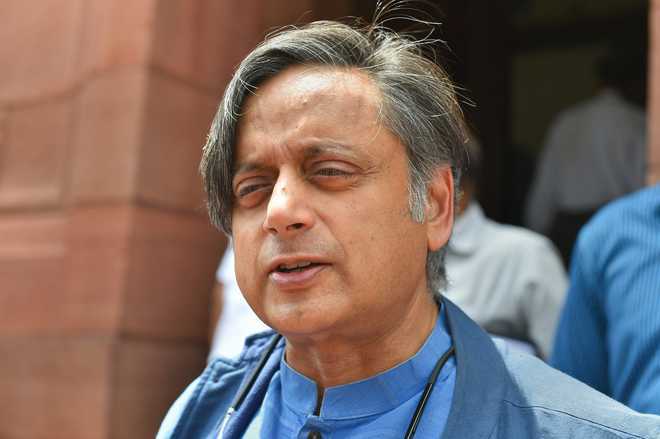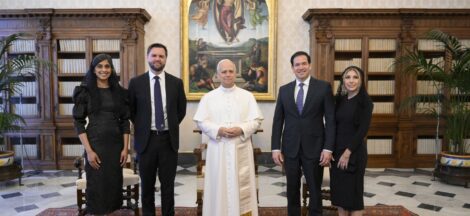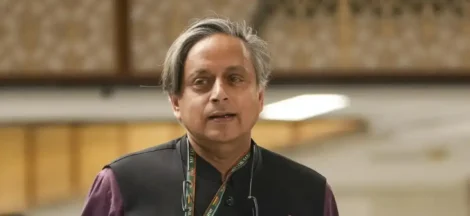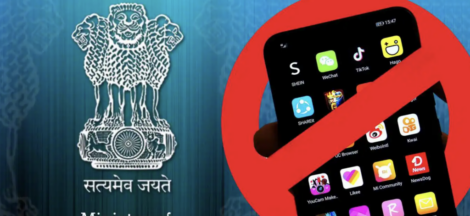THIRUVANANTHAPURAM: Courting controversies seems to have become second nature to senior Congress leader and Lok Sabha member from Kerala Shashi Tharoor.
The latest controversy the four-time Thiruvananthapuram MP has kicked up is over his naming as one of the heads of Government delegations which will visit various countries to secure their support for India’s efforts to counter Pakistan’s policy of encouraging cross-border terrorism.
Leader of the Opposition in the Lok Sabha Rahul Gandhi was unhappy about the government’s selection of four Congress MPs, particularly Tharoor and Tewari. It is learnt that Gandhi spoke to Parliamentary Affairs Minister Kiren Rijiju and conveyed his disapproval over the names picked by the Union Government.
Reports have it that Tharoor himself gleefully accepted the Modi government’s offer without taking his party into confidence. That was bad enough. What was worse, from the Congress’s standpoint, was that the Modi Government rejected three of the four the nominees that party had recommended for inclusion in the delegations. That is being perceived as a personal insult to Rahul, who has, obviously, not taken kindly to it.
Consequently, speculation is rife that the Congress may decide to withdraw Tharoor as chairman of the standing committee on external affairs.
As for Tharoor, the Thiruvananthapuram MP seems to be in a mood to stick to his stand to accept the offer. He has the solid support of many Congress leaders who are unhappy about the style of functioning of the top party leaders, are said to be of the firm view that Shashi must stick to his stand. According to a leader close to Tharoor, he has decided to be part of the delegation.
Tharoor is also on record that politics should take a backseat when it comes to matters of national interest, which is at odds with the Congress’s stand on various issues of national interest.
Tharoor reportedly held discussions with Rahul and Congress president Mallikarjun Kharge after Union minister Kiren Rijiju informed the MP of the government’s intention to consider him to lead a delegation. Both the leaders told Tharoor that the government must approve the party list.
However, Tharoor, who is said to be upset about the party high command’s decision to exclude him from the Congress list, claimed that as chairman of the panel on external affairs it is natural to invite him to be part of the delegations.
Significantly, both the United Democratic Front (UDF) led by the Congress in Kerala and the INDIA bloc partners are displeased about the manner in which the high command handled Operation Sindoor and the delegation issue. The second largest UDF partner, the Indian Union Muslim League (IUML), is particularly concerned about the growing tensions between Tharoor and his party.
In all seven delegations, comprising members from across the political spectrum, will brief foreign governments on Pakistan’s direct role in the April 22 Pahalgam terror attack, its long-standing use of terrorism as an instrument of state policy, and recent developments under Operation Sindoor. Each team will carry detailed dossiers detailing Pakistan’s complicity to mount international pressure and strengthen global consensus.
The delegations’ mission is also aimed at countering the propaganda in some international quarters which that equate India and Pakistan on the issue of terrorism. India is seeking to convey a strong message: there is no question whatsoever of comparing a nation in the thick of a battle against terrorism and the one that openly sponsors it.
Incidentally, this is not the first time such an all-party delegation is being sent to canvass support of other countries on issues if national interest. The strategy has a precedent. In 1994, the then Prime Minister P V Narasimha Rao dispatched a bipartisan team including Atal Behari Vajpayee and Farooq Abdullah to Geneva to thwart a Pakistan-backed resolution on Kashmir at the UN Human Rights Commission. The mission succeeded in exposing Pakistan’s duplicity.
Again, in the wake of the 26/11 Mumbai attacks in 2008, Prime Minister Manmohan Singh made a similar diplomatic effort. Multi-party delegations delivered irrefutable dossiers on Pakistan’s involvement, leading to global condemnation and Pakistan’s subsequent inclusion in the Financial Action Task Force’s ‘Grey List’.
Meanwhile, several Congress leaders have openly come out against Tharoor. The new UDF convener, Adoor Prakash, for instance, frowned on Tharoor’s stand. Tharoor may have his personal opinion on various issues. But he must follow the party’s official position on issues. Nobody is above the party. That was the crux of Prakash’s statement. Congress general secretary Jairam Ramesh also made no secret of his displeasure at Tharoor’s acceptance of the Government’s invitation. There is a difference between “being in the Congress and being of the Congress. Congress mein hona aur Congress ka hona mein zameen-aasmaan ka antar hai. . In a democratic system, when individual MPs are sent as part of an official delegation, MPs must seek the concurrence of the party. If the government wants to send him as part of a delegation, the MP should be asking the party.” That was Jairam’s caustic comment.
One thing is clear. The Tharoor episode has clearly rattled the Congress. Will the Congress party continue to turn a blind eye to the ‘acts of indiscipline’ indulged in by Tharoor? Or will the party say enough is enough and crack the whip ? That is the question doing the rounds. For the Congress, it is the Hobson’s choice. Damned if it takes action; damned if it does not.
The controversy erupted when the Union government announced on Saturday that Congress MP Shashi Tharoor, BJP MPs Ravi Shankar Prasad and Baijayant Panda, JD(U) MP Sanjay Jha, DMK’s Kanimozhi, NCP (SP) MP Supriya Sule, and Shiv Sena’s Shrikant Shinde will head the delegation to key partner countries to increase diplomatic pressure on Pakistan. (IPA Service)




 BJP’s Tiranga Yatra Fails To Generate Nationalist Passion Among Hindus In Uttar Pradesh
BJP’s Tiranga Yatra Fails To Generate Nationalist Passion Among Hindus In Uttar Pradesh 